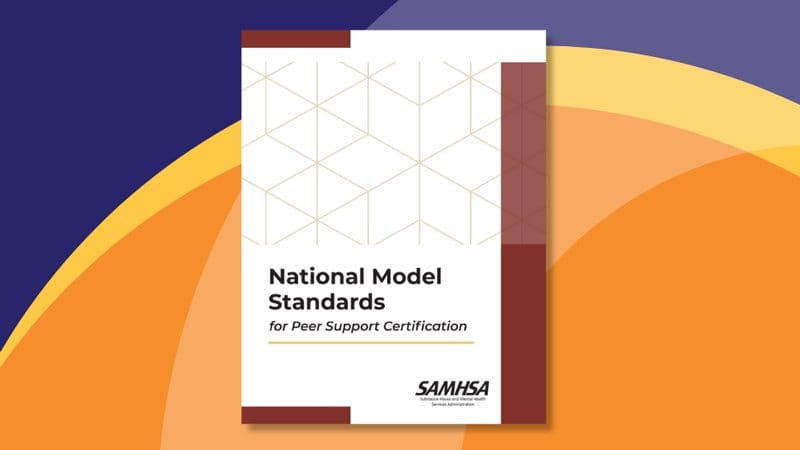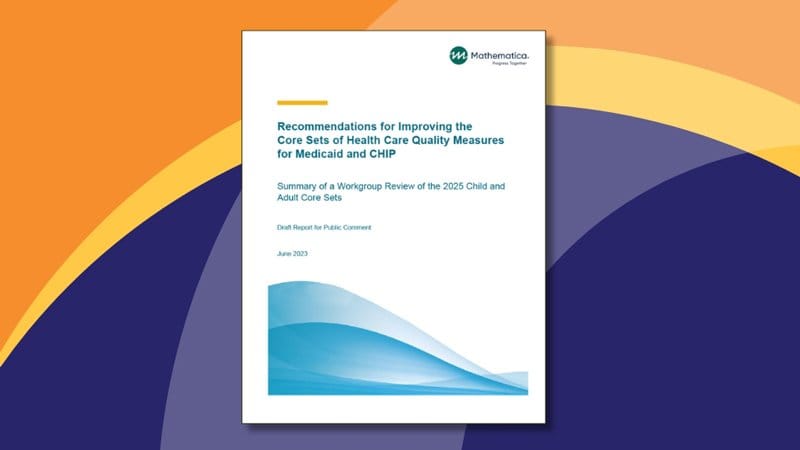On June 6th, 2023, the U.S. Department of Health and Human Services (HHS) and the Substance Abuse and Mental Health Services Administration (SAMHSA) published National Model Standards for Peer Support Certification for substance use, mental health, and family peer workers. These standards aim to accelerate the universal adoption, recognition, and integration of the peer mental health workforce across all elements of the healthcare system.
Propelling the use of certified peer support specialists within the health delivery system has been a cornerstone project of the Policy Center. Read more about our pilots and programs here.
HHS Secretary Xavier Becerra explained, “These new national standards will help advance President Biden’s strategy to tackle the nation’s behavioral health crisis. We can improve health outcomes for people with behavioral health issues by better integrating the peer workforce into our health care system. Getting help from a person who has been successful in the recovery process can be life-changing.”
These standards were developed in accordance with President Biden’s 2022 State of the Union Address, where he announced the national strategy to address the nation’s mental health crisis. They were developed through a detailed review of current state certification processes, collaboration with federal, state, tribal, territorial, and local partners, peer specialists, and public comment requests. Cindy Herrick, the Policy Center’s Special Projects and Peer Support Lead, was a member of SAMHSA’s technical Expert Panel on Peer Support Certification.
In April, the Policy Center also submitted the following feedback to SAMHSA on the development of the standards.
HHS explains that these national model standards are not to replace state certifications but are intended to be guidance for states to encourage alignment across state peer support certifications.
Eleven national standards were developed to guide states on these topics:
- Authenticity and Lived Experience
- Training
- Examinations
- Formal Education
- Supervise Work Experience
- Background Checks
- Recovery
- Diversity, Equity, Inclusion, and Accessibility
- Ethics
- Costs and Fees
- Peer Supervision
In a presentation by leaders within HHS, they emphasized the standard that hadn’t been addressed by most states, is the creation of a state certification for peer supervisors.
Further, SAMHSA addressed the following recommendations from the Policy Center’s April 2023 letter:
- Policy Center’s Feedback: Not all states have training and/or certification in place for peers delivering mental health services (many only train and/or certify for peers delivering substance use support). It’s important for states to have training and certification in place for peers providing mental health services to populations suffering from serious mental illness (SMI) and non-SMI, such as those suffering from depression and anxiety.SAMHSA’s National Model Standards: “SAMHSA’s National Model Standards for Peer Support Certification are not intended as a substitute for any state certifications but instead have been developed as guidance for states, territories, tribes, and others, to promote quality and encourage alignment and reciprocity across often disparate state peer support certifications. Since the 2015 release of the SAMHSA’s Core Competencies for Peer Workers in Behavioral Health Services2, the peer workforce has flourished, resulting in the implementation of state-endorsed or state-run peer certification programs across 49 out of 50 states3. The National Model Standards are designed to accelerate universal adoption, recognition, and integration of the peer workforce, and strengthen the foundation set by the peer workforce, reinforced by the Core Competencies, and implemented by our state, local, and tribal partners.”
- Policy Center’s Feedback: Not all state Medicaid programs reimburse peers providing mental health care (some only reimburse for substance use peer support services)SAMHSA’s National Model Standards: “States should consider revisiting policies that require formal education of certified peer workers for reimbursement (e.g., third-party payors) and seek to incorporate parity across reimbursement standards and requirements for mental health, substance use, and family peers.”
- Policy Center’s Feedback: A more robust approach to facilitating and encouraging reciprocity of certification between states, with a recognition of the important role of virtual peer support. Maternal mental health peer support has found success on a virtual platform due to the demand to meet mothers where they are, as mental health issues have been further exacerbated during the pandemic. It is critical to implement actionable plans to create reciprocity between states to further facilitate peer support virtually across state lines, particularly for states with the highest HRSA mental health provider shortage areas. SAMHSA’s National Model Standards: “Every state certification brings a unique set of strengths and challenges, and SAMHSA is confident that the (certification) processes being utilized across the nation are developing strong, committed, and knowledgeable, certified peer workers. It is for this reason that SAMHSA is recommending that state certification entities strengthen collaboration efforts and implement additional processes for expanding reciprocity, and strongly encourages state certification entities to utilize this document to revise, strengthen, and align their peer support certifications with other states. A few potential strategies for supporting and expanding the peer workforce were identified and are outlined in Exhibit A. A set of guiding questions were also developed for state certification entities to consider during revisions and when exploring strategies for increasing reciprocity and expanding the peer workforce and are outlined in Exhibit B.”In order to support and expand the peer support workforce, SAMHSA recommends to: 1. Establish a reciprocity board or committee made up of certified peer workers. 2. Create an interstate compact or other binding document that can be used to establish reciprocity between states. 3. Connect with a national reciprocity organization to discuss strategies for implementing reciprocity.
- Policy Center’s Feedback: Consider the need for establishing and developing a more systemic infrastructure to help organizations navigate the hiring, billing, and reimbursement process of peer services. Currently, the reimbursement process can be quite complicated for individuals or groups that are new to peer support, including becoming a Medicaid provider, billing, and reimbursement. This is a significant barrier to entry for hiring peers among sophisticated healthcare providers and for individual peers alike. This is also a barrier for community-based organizations that generally don’t have the experience or funding to establish reimbursement protocols on their own.SAMHSA’s National Model Standards: State certification entities [should] partner with hiring organizations and peer and family-run entities to develop and implement supervisor-specific career pathways for certified peer workers.
Only one piece of our recommendations was not addressed in the new national standards for certification:
Policy Center’s Feedback: Most private insurers aren’t credentialing or reimbursing peer support specialists, essentially leaving those with private insurance without coverage of peer support.
We believe it’s critical for SAMHSA and state Health and Human Services agencies to address private insurer coverage of certified peer support specialists and will continue to promote this critical policy change.
You can read SAMHSA’s National Model Standards for Peer Support Certification brief here.



